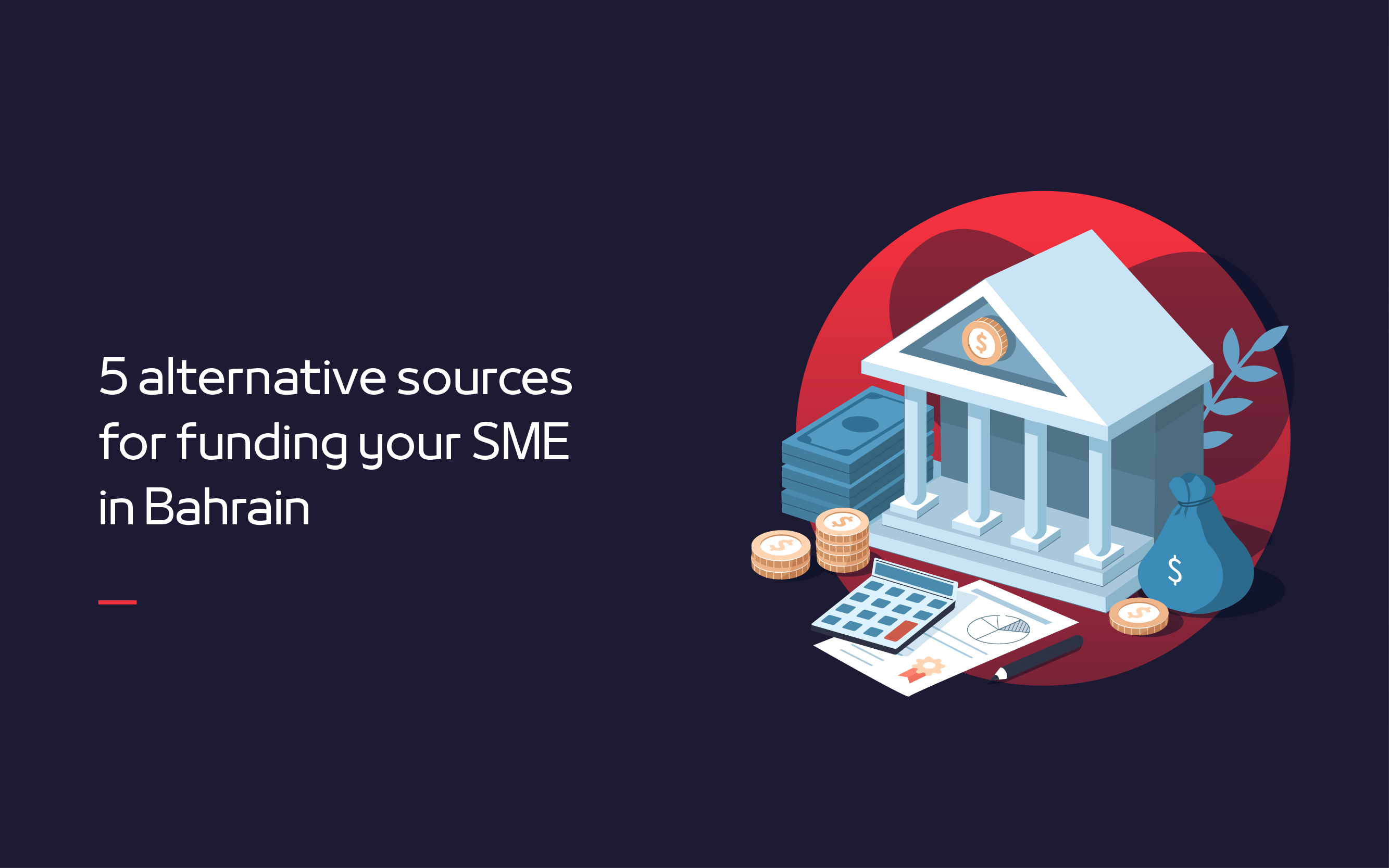
5 alternative sources for funding your SME in Bahrain
Small and medium-sized enterprises (SMEs) are an essential part of Bahrain’s economy, accounting for almost 30% of the country’s GDP. However, numerous financial challenges result in many of them failing before they have a chance to mature and grow. The ability of many SMEs to tap bank financing is limited. Exploring financing solutions beyond traditional bank loans is, therefore, crucial for SMEs to thrive in today’s competitive business environment. Many of these solutions offer other benefits through flexibility, networks, mentoring, etc. In this post, we will discuss some of the different sources of funding available for SMEs in the Kingdom, including convertible notes and crowdfunding.
Convertible Notes
Convertible notes are an alternative form of financing that can be an attractive option for both investors and entrepreneurs, as they can be converted into equity at a later stage, usually when the company raises its next round of funding or during an exit event such as an IPO or acquisition. In 2020, Bahrain amended its Commercial Companies Law to allow SMEs and startups to raise funds through convertible notes, becoming the first GCC mainland jurisdiction to provide for the use of these debt instruments.
Convertible notes have several advantages. For investors, they offer a chance to invest in a company with the potential for high growth while mitigating some of the risks associated with investing in an early-stage business. For entrepreneurs, convertible notes provide a flexible financing option that allows them to defer valuation until a later stage while also avoiding the need to give up equity in their company too early.
Crowdfunding
Another financing method is crowdfunding, which has become an increasingly popular financing option for SMEs in recent years, thanks to the rise of online platforms that make it easier to connect entrepreneurs with potential investors. Crowdfunding is a process in which a large number of people contribute small amounts of money to a business in exchange for rewards or equity. There are two main types of crowdfunding: reward-based and equity-based. With the former, investors receive a product or service in exchange for their contribution. With the latter, investors receive shares in the company in exchange for their investment.
Crowdfunding has several advantages for SMEs. It can provide access to a large pool of potential investors, which can increase the likelihood of successfully raising funds, and it can help SMEs to build a loyal customer base and generate buzz around their products or services.
In 2022, the Central Bank of Bahrain (CBB) responded to the increased demand for new financing products to serve SMEs and start-ups by issuing regulations applicable to crowdfunding platform operators that are in line with the Economic Recovery Plan. The new regulations streamline the process through cost efficiency and simple infrastructure, making crowdfunding a convenient option for entrepreneurs in the Kingdom.
Venture Capital
Venture capitalists are investors who provide funding to early-stage or high-growth businesses with the potential for significant returns. They typically invest in exchange for an equity stake in the company and play an active role in the business, providing strategic guidance and industry expertise.
Venture capital can be attractive for SMEs that have high-growth potential but need significant investment to scale up their operations. Alongside funding, venture capitalists can also provide access to a network of contacts that can help SMEs expand their customer base and establish partnerships.
However, venture capital funding can be difficult to obtain, and SMEs may need to have a proven track record of success or a unique product or service to attract it. SMEs that do secure venture capital funding may also need to give up a significant amount of equity in their company.
From a regulatory standpoint, Bahrain has a long-standing record when it comes to investment companies such as venture capital firms, with the Central Bank of Bahrain (CBB) having a license category governing this type of business activity.
Angel Investors
Similar to venture capital, this is also a good source of funding, the main difference being that angel investors are typically high net worth individuals who invest their own money into startups and are often more willing to take risks.
Angel investors provide capital to early-stage or start-up companies in exchange for an equity stake in the business. They can also provide mentorship and guidance to entrepreneurs based on their own experience as successful business owners.
Angel investors can be an attractive funding option for SMEs in Bahrain, particularly those that are too early-stage to attract venture capital. Angel investors may also be more willing to invest in a particular industry or niche market, making them a good fit for SMEs that operate in specialized sectors.
Like venture capital, angel investment can be difficult to secure, and SMEs may need to have a strong business plan and a compelling pitch to attract it. However, an angel investor at the right time can be the perfect partner for growth.
Entrepreneurs looking to explore this avenue of financing can take part in dedicated events in the Kingdom, such as the Global Entrepreneurship Week, organized by Tamkeen in collaboration with Tenmou, Bahrain’s first angel investors organization, which provides guidance and funding opportunities to high-potential and innovative projects.
Trade Credit
Trade credit is a form of credit extended by suppliers to their customers, allowing them to purchase goods or services on credit terms and pay later, usually within 30 to 60 days. The laws and regulations set by the CBB protect the interests of creditors and ensure that trade credit transactions are fair and transparent, making it a reliable and viable funding method.
Trade credit is an attractive financing option for SMEs that have a good relationship with their suppliers and a proven track record of timely payments. By using trade credit, SMEs can free up cash flow and improve their working capital, allowing them to invest in other areas of their business, such as marketing and product development.
Furthermore, trade credit can help SMEs build their credit profiles and improve their creditworthiness, making it easier to access other forms of financing in the future. However, it is essential to note that late payments or defaults on trade credit can have adverse consequences, such as damaging supplier relationships and impacting the SME’s credit score.
Despite historical challenges, the range of funding options for Bahraini SMEs has been growing at a brisk pace. Different solutions come with different conditions and benefits. It is worthwhile understanding the options to devise the best approach for your company. We urge you as an entrepreneur to explore the various funding options open to SMEs in Bahrain, depending on your business needs and growth objectives. This access to capital may be the key to expanding your operations, increasing revenue, and achieving long-term success.

